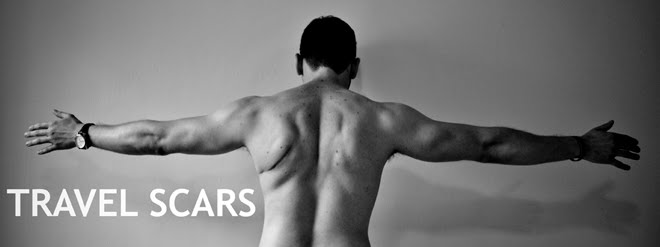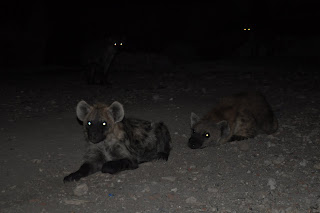I don't know why we always decide to binge-drink before embarking on a long bus journey, but it happens more often than not. After copious amounts of St-George beer and dancing with Muluneh, we stumbled out of bed and hailed a cab to the bus station.
Most bus journeys you can just sleep through, but Ethiopia has the most stunning landscapes of any African country I have visited. It would be a shame to miss any of it. The 10-hour bus ride dropped us off in Harar, where we were greeted by a young man named Solomon, who then offered to give us a tour and recommended a nearby hotel to stay at. The hotel was the guide-book recommended Tewodros Hotel, however I wouldn't even recommend it to my enemies: the cleanliness and facilities were disgusting and the probable reason for me getting fleas (more on that in a later post).
The rest of that first day we just lounged around and chatted with Didi, a Swiss traveler who had also travelled up from South Africa by public transport. Solomon, the guide who had greeted us, was going to meet us the next morning to give the three of us a tour of the walled city of Harar, revered as the 4th most important in Islam after Mecca, Medina, and Jerusalem.
That night, however, was continually disturbed by the incessant howling of dogs and wailing of hyenas, both vying for each other's territory. This combined with the loudest cricket I have ever heard hiding in our bathroom, boring a hole in my brain with his interminable chirping, left the night's sleep as a hopeful desire rather than a given.
The following morning, Solomon was on time, which is rare among Africans, and we made our way to the principal gate of the ancient city. The smells, sights and sounds of the vendors' booths were intoxicating. Although Harar now has a Christian majority, the residents within the walls of the city are unmistakably Muslim.
Old Harar, which occupies an area of only 48 hectares, once contained 99 mosques, one for each of Allah's sacred names. Solomon had given us an incredible 4-hour tour and explained many aspects and historically significant details that would have been easily missed on an independent exploration of the city. As a UNESCO World Heritage site, much work is being done to preserve the ancient buildings and keep the city clean.
While we were walking through a narrow street, a young girl poured some dirty water onto the cobblestone road. Didi then knocked on her family's door and told her she shouldn't be doing that. Solomon called him Mr. UNESCO for the remained of our tour due to this. A woman across the street commended this action and invited us into her home for chai, injera and wot. We sat and ate in a traditional Harari Muslim home and enjoyed the great hospitality.
Our tour ended at the only church within the walled city, which had been converted under the order of Haile Selassie, the last emperor of Ethiopia. We had enjoyed the tour so much that Solomon had offered to take Chris and I to the city of Babile to visit Ethiopia's largest camel market the following afternoon. That evening, that infernal cricket was back again and I was incredibly ichy and had developed several small bites on my chest.
Following another restless sleep, we met Solomon in the morning and hopped into a microbus and arrived in the nearby city of Babile. From there, we boarded an immense Chinese-owned dump-truck, which brought us to the valley of Marville. There we hiked through the hills adorned with interesting but phallic rock formations and walked along paths used by Somali smugglers and refugees ( we were only 100 km from the border of Somalia).
After this, we went to the camel market where hundreds of thousands of camels are bought and sold to wealthy Arabs from as far away as Saudi Arabia and Yemen. To add to the fascinating sight of these 4-legged giants, the market was set atop a beautiful mountain vista.
Solomon, as his name suggests, is actually a Falasha: an Ethiopian Jew, whose ancestors are believed to be descendants of the lost tribe of Israel. He is studying to be an accredited tour guide and gives tours to travelers as practice. Incredibly enough, Solomon had already given tours to the likes of Bob Geldof and K'naan, the Somali-Canadian rapper whose "waving flag" became the anthem to South Africa's World Cup and which we had heard countless times throughout the continent.
The only thing more profitable to the population of Harar than camels is chat. Chat is a plant with the properties of a mild to moderate stimulant drug. You cannot walk several meters without seeing someone chewing on its leaves, their teeth either missing or stained green from the chronic chewing of this addictive plant. Nearly the entire population is addicted to it and there is even a time of day reserved for the chewing, which continues until nightfall.
Although legal, in the rest of the country there are programs set up to help people who are addicted to it, whereas in Harar, such assistance does not exist because people have chewed it since ancient times and it is considered part of the culture. Even beggars will use any money they receive to buy it and people willfullingly give them money to acquire it because they understand their plight. One of the major issues with it is that is supresses appetite and as a consequence, its destitute, skeletal users would rather chew than feel the pangs of hunger associated to their poverty and lack of food. Chris and I had tried the Kenyan version of it, known as Mira, with Masoud in Uganda, but felt nothing more than a slight buzz and a sore jaw. Still, we wanted to se what the hype regarding chat was about. We wanted to try the real deal.
Solomon had agreed to get us some good quality chat and we would chew it for several hours at Amir's house with some tea and shisha. Amir is an Ethiopian-Canadian from Toronto, operating a handcraft shop in Harar. He often lets tourists hang out in his place and welcomes feedback on their experiences in Ethiopia.
After chewing the bitter herb for 3-4 hours, smoking shisha and sipping tea; I do admit that I felt a decent buzz, but the same effect could be achieved by drinking 2-3 cups of strong coffee. With our hearts beating faster due to the stimulant properties of the drug and our senses heightened, Solomon led us through the winding roads to do what the majority of Harar's tourists are drawn to: feeding wild hyenas with Harar's famed 'Hyena Man'. Although the practice does not date to ancient times, this Hyena Man has been feeding hyenas for over 20 years, replacing the previous man who pioneered this perverse pastime.
Solomon greeted the man as we stood just outside the walls of the city, looking at close to 30 hyenas waiting to be fed. The man instructed us to get on our knees and we held a short stick with raw meat on it to feed these massive animals.
With each piece of meat, another hyena clamped its powerful jaws around it just inches from our faces or hands. The Hyena Man was deliberate and stern with these wild dogs and assured us that he was in control. That he was the boss.
After 15 minutes of flinching and hoping that my limbs and face would remain intact after this fantastic feeding, the Hyena Man was out of meat. We thanked him and the hyenas for this incredible experience and then went back to Amir's.
Solomon had showed us an incredible time and I wish him all the best in life. Although I didn't come to Harar as a Muslim pilgrim, I still left an enlightened man with amazing experiences in a holy city with tremendous character and an infallible, addictive culture.
But addictive in the best kind of way.





























No comments:
Post a Comment